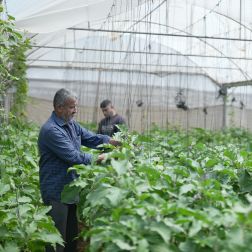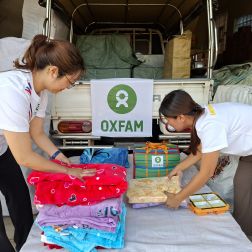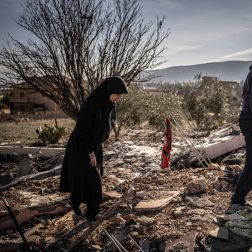- 6 mins read time
- Published: 15th March 2016
Ireland stands with Syrian refugees - 5 years on
“What’s with the shovels?” It was late October and I was standing in the baking heat, surrounded by the makeshift tents that Syrian refugees must call home for now on a dusty stretch of land in Lebanon’s Bekaa Valley.
“It’s for the snow,” my Oxfam colleague Mohammed replied, as he distributed water filters with one arm and the shovels with the other. “They’ll need to clear it away from the tents in a few weeks’ time.”
I looked over at the boy holding his mother’s hand, not more than two, who was making funny faces at me. I thought about how his parents would try to keep him warm with only plastic sheeting between them and the harsh Lebanese winter. A few weeks later the snow came. I think about that boy all the time.
The cold winter that followed my visit is ebbing away, but, as we mark five years since the conflict in Syria began, the plight of those who remain inside Syria and those who managed to cross into neighbouring countries and further afield is unchanged.
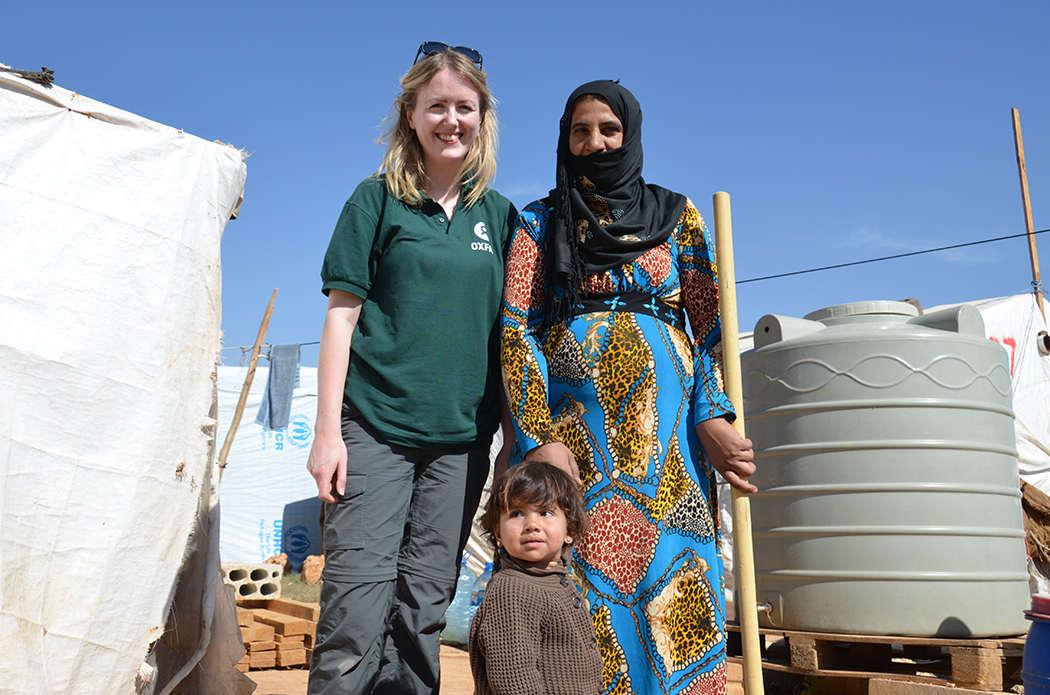
Sorcha in Lebanon: Oxfam Ireland’s Sorcha Nic Mhathúna with a Syrian refugee who has received a water filter and a shovel from Oxfam. The shovel is vital for clearing away the snow from outside the tents in winter. Lisa Rutherford/Oxfam
In a town near the camp, the population was around 6,000 a few years ago, before the war broke out in neighbouring Syria. Now its remarkable citizens have welcomed 25,000 Syrian refugees to their district. Throughout Lebanon it’s a similar story – communities who see it as the right thing to do to host those arriving from Syria.
Oxfam supporters across the island of Ireland are also standing in solidarity in the face of adversity, allowing us to provide over 85,000 people in Lebanon and 46,000 in Jordan with clean drinking water or cash and relief supplies. In Syria, we have reached an estimated 1.5 million in conflict-affected areas with clean water through the rehabilitation of water infrastructure, water trucking and repairing of wells.
Back to Lebanon’s Bekka valley, where we drive past the municipal waste facility where Syrian refugees and locals work side-by-side in a ‘cash for work’ scheme begun by Oxfam and the local council. With such a massive rise in the local population, it’s vital that rubbish is collected and properly disposed of to prevent the spread of disease. We walk through a new park where another team are building a space for refugees and local people alike to enjoy – a space away from the crowded quarters where refugees like Adnan*(14) live.
He had to have his right leg amputated after being wounded when his home was shelled and reduced to rubble. When they first arrived in Lebanon, his family lived in an abandoned garage, where the unhygenic conditions caused some of the family to develop respiratory illnesses before finding this flat. Despite the differences in the Syrian and Lebanese school systems, Adnan has managed to get very high grades. Asked what his hopes are the future, he replies: “I hope to become a doctor some day.” In the meantime, the money earned by his mother Salwa (33) through the Oxfam community ‘cash for work’ scheme is a lifeline.
Further down the road Syrian refugee and mum-of-five Sanaa (33) holds her two-month-old baby boy. She and her husband came here from Damascus but have been unable to pay the rent for the past two months. Back in Syria, her husband Rami used to work transporting furniture but then their house was destroyed in the fighting.
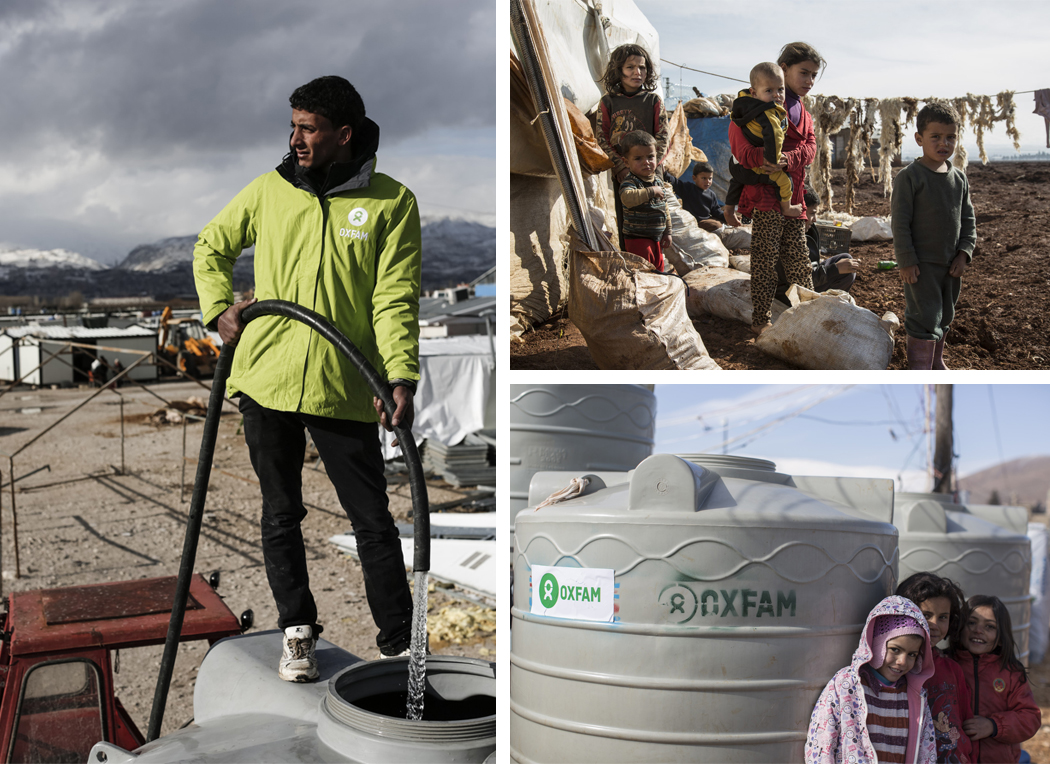
Clockwise from left: Hussein (20) fills a water tank with water supplied by Oxfam at an informal settlement for Syrian refugees near the town of Zahle in Lebanon's Bekaa Valley. Hussein, from the outer suburbs of Damascus, lives in the camp. Sam Tarling/Oxfam. Siblings from Raqqa in Syria try to warm themselves in the sun outside their tent at an informal settlement for Syrian refugees near the town of Baalbek in Lebanon's Bekaa Valley. Sam Tarling/Oxfam Friends Majida* (7), Aida* (8) and Basma* (8) from Raqqa in Syria, play next to a water tank that was provided by Oxfam at an informal settlement for Syrian refugees near the town of Baalbek in Lebanon's Bekaa Valley. A supply of clean water is essential to prevent the spread of diseases. *Children’s names have been changed to protect their identity. Sam Tarling/Oxfam
They have benefitted from the Oxfam scheme, and they need the money to buy nappies and also additional milk for their baby as she is not producing enough milk herself.
In recent times the world has been moved by the terrible images of men, women and children risking their lives in unsafe boats or at the hands of smugglers in a bid to reach safer shores.
Oxfam works in the top nine countries of origin for refugees in the world (including Syria, Afghanistan, Somalia, Sudan, South Sudan and Democratic Republic of Congo) as well as host countries where four-fifths of the world’s total population of refugees have fled (e.g. Pakistan, Lebanon, Jordan and Turkey). In the past year we have provided humanitarian support in the form of water, food and a means to earn a living to more than five million people in areas affected by conflict, helping to reduce the poverty in camps and host communities by informing people of their rights so they can raise their issues and concerns.
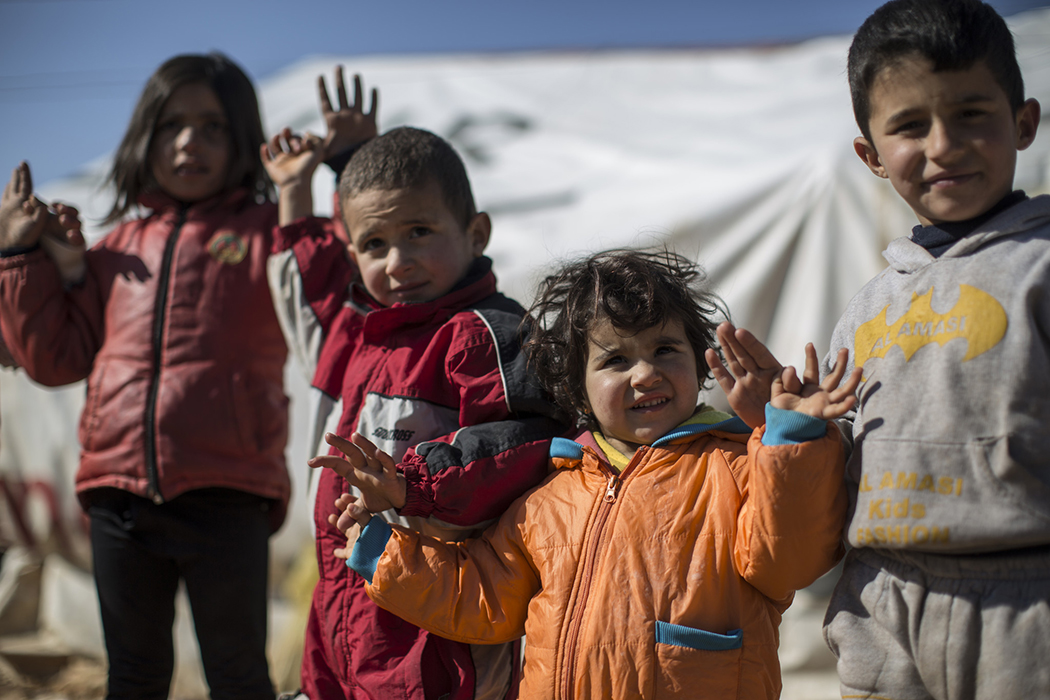
Above: Basma* (8), Mohsen* (4), Amal* (3) and Ahmad* (6) pose for a photograph supporting the global #WithSyria campaign to mark the fifth anniversary of the Syrian conflict, at an informal settlement for Syrian refugees near the town of Baalbek in Lebanon's Bekaa Valley. *Children’s names have been changed to protect their identity. Sam Tarling/Oxfam
And we are there as people arrive on the borders of Europe – in Serbia and Macedonia and on the trains. This ranges from providing hot meals to those arriving on the Greek island of Lesbos to installing toilets and showers and distributing everything from hygiene and sanitary packs to socks, coats and blankets to about 100,000 people in Serbia and in Macedonia. In Italy we provide asylum seekers with housing, food, psychological support, legal assistance and language classes.
What is happening in the world today is a displacement crisis, with almost 60 million people (the highest number since the Second World War) who have been forced to flee their homes.
The world’s poorest countries currently host 86% of the world’s refugees and are stretched to their limits. Countries neighbouring those in crisis host the largest numbers.
Lebanon (the size of Munster) alone hosts 1.2 million Syrian refugees within a total population of 4.5 million, which means that about one out of every five people is a refugee from Syria. That is why aid to those countries is so important, as well as ensuring those arriving in Europe get the healthcare, shelter and other vital support they need.
Thank you for standing with us. Your support is a beacon of hope in the darkest of hours.
*Names of those aged under 18 have been changed.
Sorcha Nic Mhathúna is Oxfam Ireland’s Communications and Content Manager.

